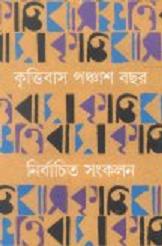
Krittibas
Encyclopedia

Bengali language
Bengali or Bangla is an eastern Indo-Aryan language. It is native to the region of eastern South Asia known as Bengal, which comprises present day Bangladesh, the Indian state of West Bengal, and parts of the Indian states of Tripura and Assam. It is written with the Bengali script...
poetry magazine that first appeared in Kolkata
Kolkata
Kolkata , formerly known as Calcutta, is the capital of the Indian state of West Bengal. Located on the east bank of the Hooghly River, it was the commercial capital of East India...
in 1953. It played a highly influential role in the Kolkata literary scene in the decades after Indian independence, and provided a platform for young, experimental poets, many of whom went on to become luminaries of modern Bengali poetry.
The editors of the inaugural issue in July 1953 were Sunil Gangopadhyay
Sunil Gangopadhyay
Sunil Gangopadhyay , is a celebrated Indian poet and novelist.-Early life:...
, Ananda Bagchi and Dipak Mazumdar. Gangopadhyay later became sole editor, and indeed it is his name that is most closely associated with the magazine. Others who also edited the magazine at one point or another included Shakti Chattopadhyay
Shakti Chattopadhyay
Shakti Chattopadhay was a Bengali poet and writer, widely regarded as one of the greatest poet of 20th century Bengali literature. -External links:...
, Sarat Kumar Mukhopadhyay and Samarendra Sengupta.The Phanishwarnath Renu issue of the magazine was edited by Samir Roychoudhury
Samir Roychoudhury
Samir Roychowdhury , one of the founding fathers of the Hungry Generation 1961-1965 ,was born at Panihati, West Bengal, India in a family of artists, sculptors, photographers and musicians...
. During 1961-65 several poets left the magazine and joined the Hungryalist Movement.
Originally published as a quarterly, Krittibas became a monthly magazine in 1974. Besides promoting Bengali poetry - always its main focus - it also featured articles on various aspects of contemporary arts and culture.
In its early decades, Krittibas had a strong anti-establishment
Anti-establishment
An anti-establishment view or belief is one which stands in opposition to the conventional social, political, and economic principles of a society. The term was first used in the modern sense in 1958, by the British magazine New Statesman to refer to its political and social agenda...
flavour to it. (In 1963, the Hungryalists were hauled into court on charges of obscenity
Obscenity
An obscenity is any statement or act which strongly offends the prevalent morality of the time, is a profanity, or is otherwise taboo, indecent, abhorrent, or disgusting, or is especially inauspicious...
; the Editor of the magazine, as defense witness for Malay Roy Choudhury
Malay Roy Choudhury
Malay Roy Choudhury is a Bengali poet and novelist who founded the "Hungryalist Movement" in the 1960s. His literary works have been reviewed by sixty critics in HAOWA 49, a quarterly magazine which devoted its January 2001 special issue to Roy Choudhury's life and works...
responded by reading out the controversial poem Stark Electric Jesus in the courtroom!) But with the accretion of time and prestige, this trend waned and Krittibas itself became part of the cultural establishment.
Publication ceased altogether in 1982, and the magazine disappeared from the scene for many years. Then in 1999, Krittibas was reborn, this time as an annual magazine. Soon it became a bi-annual journal, and plans are afoot to turn Krittibas into a quarterly again. Those Kolkatans who have been instrumental in the revival of the magazine are Bhaskar Dutta, Pradip Chandra Basu and Bijesh Saha.
In 2003, Krittibas celebrated its 50th anniversary with great fanfare.

